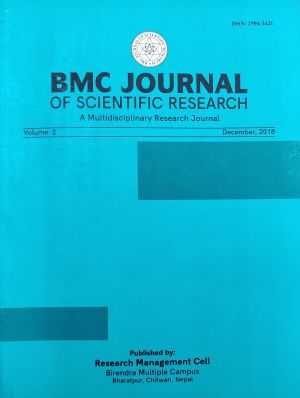Alienation and Double Consciousness in Jhumpa Lahiri’s Short Story “When Mr. Pirzada Came to Dine"
DOI:
https://doi.org/10.3126/bmcjsr.v2i1.42728Keywords:
Diaspora, Alienation, Double Consciousness, Cultural LossAbstract
Decolonisation and globalisation have given tremendous impetus to the shift and mobility of people from the former colonies and semi colonies to the metropolitan locations. This has brought about big changes in how they live, how they think and what they experience. Designated as diaspora, this kind of living has offered some opportunities and at the same time posed multiple challenges and problems. In this article, an attempt has been made to analyse Jhumpa Lahiri’s short story “When Mr. Pirzada Came to Dine” from the angle of how such diasporic living is problematic and full of tension and the characters’ psyche is drawn towards two conflicting cultural locations- the original and the cosmopolitan. The focus of the analysis is Mr. Pirzada, the central figure of the story. As the representation of this kind duality of living in literature is studied under the rubric known as Post Colonialism, I have used the theoretical views of the post colonial scholars like Arjun Appadhurai, Radhakrishnan Rajgopalan and others as conceptual tools for this purpose.
Downloads
Downloads
Published
How to Cite
Issue
Section
License
Copyright (c) 2018 Research Management Cell, Birendra Multiple Campus, Bharatpur, Chitwan, Nepal

This work is licensed under a Creative Commons Attribution-NonCommercial-ShareAlike 4.0 International License.




